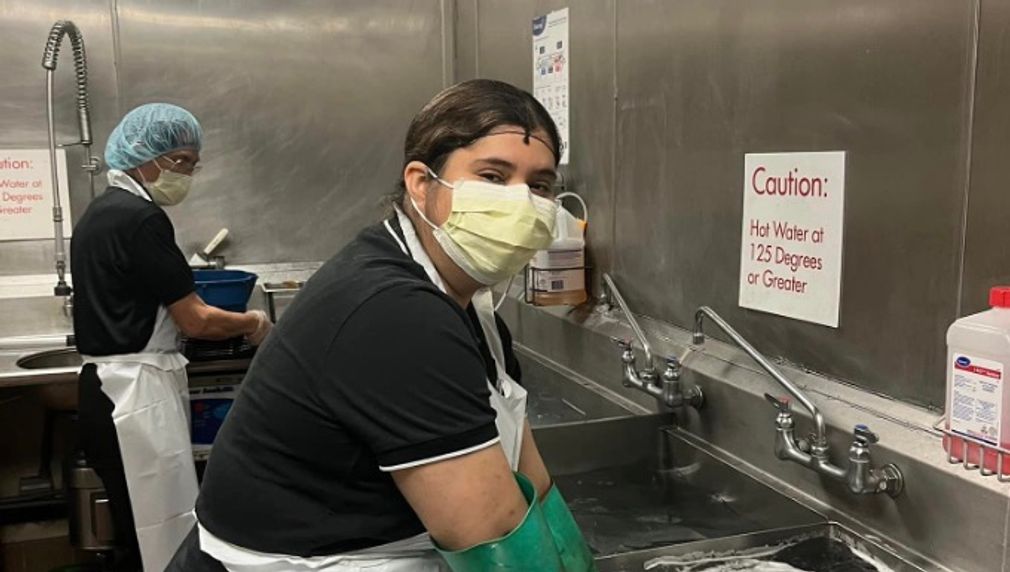Adults with disabilities meet hunger crisis
Program participants (“associates”), who have lifelong developmental disabilities, obtain job skills by planning, preparing, and serving meals to age 55+ program residents who are experiencing homelessness. The program operates year-round, Monday through Friday at Tierra’s Sunland industrial kitchen and National Health Foundation’s Arleta recuperative care site. With the individualized support of Tierra staff, associates earn food handling certificates, as well as gain experience and skills to obtain long-term employment in the food industry.

What is the primary issue area that your application will impact?
Food insecurity and access to basic needs
In what stage of innovation is this project, program, or initiative?
Pilot or new project, program, or initiative (testing or implementing a new idea)
What is your understanding of the issue that you are seeking to address?
People with disabilities are hindered from full community participation on systemic and individual levels (Rehab. Psychology Journal 2020). This contributes to loneliness and poor health, such as high blood pressure. However, working and volunteering improve physical health (Socioeconomic Planning Sciences Journal 2020). Disability inclusion strategies make healthy living easier for all people across community sectors where they may live, learn, work, play, pray, and receive care (CDC 2020). As adults with disabilities engage with their communities, other community members gain firsthand experience of people with disabilities holding valued roles. This then changes their perception of these community members. Meal recipients include unsheltered older adults, who are the largest growing segment of the homeless population in L.A. County (LAHSA 2020). The program advances United Way L.A.’s March 2022 older adult homeless plan, which identified the need for these types of services.
Describe the project, program, or initiative this grant will support to address the issue.
Through this program, Tierra combats food and housing insecurity. People in Tierra’s program (“associates”), who have lifelong developmental disabilities, will plan, prepare, and serve meals to community members who are unable to leave their homes, food-insecure adults with developmental disabilities, and recuperative care program residents. The program has four main components: Job training for adults with developmental disabilities; Essential nutrition for adults with developmental disabilities; Meals on Wheels food preparation and delivery; and preparing meals for unhoused senior residents of a recuperative care center. The training program operates year round Monday through Friday. Enrolled associates provide four meals per day to associates at Tierra’s campus, using Tierra’s Sunland dining area and industrial kitchen. Associates also prepare food for National Health Foundation’s Arleta site. These associates earned their food handling certificate, and gained experience and skills to run the kitchen. The recuperative care program provides trauma-informed care to older adults over the age of 55 experiencing homelessness, until they are able to find permanent housing. Associates also volunteer with Meals on Wheels to deliver meals on 34 routes per week. Staff drive vehicles from Tierra’s fleet, and support associates to pick up meals, and deliver them to ensure home-bound residents receive healthy food.
Describe how Los Angeles County will be different if your work is successful.
This work will provide an example of partnership between nonprofit organizations, showing how organizations with different missions and target demographics can work together to make a larger impact. Rather than addressing issues as individual organizations or within specific issue areas, this project finds ways to overlap the needs of different communities, and then meet those needs with the strengths of those communities. Rather than seeing people with disabilities as solely recipients of services, this project elevates individuals’ skills and contributions. By modeling this partnership, other communities’ needs can be re-envisioned to see how they can contribute rather than create different classes of “service providers” and “service recipients.” At the same time, the individuals involved will have opportunities to pursue their own dreams and goals.
What evidence do you have that this project, program, or initiative is or will be successful, and how will you define and measure success?
(1) Healthy meals will be served to qualified participants.
Tierra will see a planned increase in its meal services as residents are admitted to National Health Foundation’s recuperative care facility this summer. Initially, 95 residents will move in once the facility opens (expected July). Over the following months, residents will move in to meet the facility’s capacity (148). Each resident will receive three meals and one snack per day. Therefore, we anticipate more than 215,000 meals served during the period of performance. These are in addition to the meals that are being served through the other program components (essential nutrition for adults with disabilities, and the Meals on Wheels partnership).
(2) Adults with disabilities will gain transferrable job and life skills.
This training prepares this low-income population to gain paid employment that will launch them out of poverty. Participants in the program have thus far achieved their Safe Food Handling certifications.
Approximately how many people will be impacted by this project, program, or initiative?
Direct Impact: 311.0
Indirect Impact: 129.0